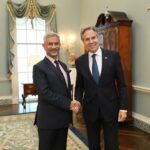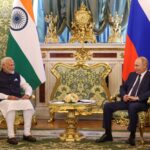India’s Foreign Minister, S. Jaishankar, emphasized that peace and stability are essential for development while highlighting “terrorism, extremism, and separatism,” as “three evils,” that must be addressed to foster trade and connectivity.
Addressing the 23rd Shanghai Cooperation Organization (SCO) Meeting of Heads of Government, on October 16, 2024, in Islamabad, Pakistan, Minister Jaishankar noted, “It is axiomatic that development and growth requires peace and stability. And as the Charter spelt out, this means being firm and uncompromising in countering the ‘three evils’,” adding, “If activities across borders are characterized by terrorism, extremism and separatism, they are hardly likely to encourage trade, energy flows, connectivity and people-to-people exchanges in parallel.”

He underscored that progress can only be achieved through a strong commitment to the charter of the SCO. Established in 2001 in Shanghai, the SCO initially included six member countries: China, Russia, Tajikistan, Kyrgyzstan, Kazakhstan, and Uzbekistan. India and Pakistan became members in 2017, followed by Iran in 2023, and Belarus in 2024. Additionally, the SCO has two observer states, Afghanistan and Mongolia, along with 14 dialogue partners, which include Türkiye.
Jaishankar’s visit to Islamabad is of significance as it marks the first time – in nearly a decade – that a high-ranking Indian Minister has traveled to Pakistan. The last such visit was in 2015 by the late Sushma Swaraj, India’s then Foreign Minister, when she attended a security conference and held talks with Pakistani officials. Shortly after her visit, Indian Prime Minister Narendra Modi made an unexpected stop in Lahore to meet with then Pakistani Prime Minister Nawaz Sharif.
Jaishankar’s visit follows a similar track to the SCO Foreign Ministers meeting held last year in India, which was attended by his Pakistani counterpart, Bilawal Bhutto Zardari. Zardari’s visit marked the first visit by a senior Pakistani politician to India since 2011. India chaired the SCO in 2023, and Pakistan hosted this year’s Summit from October 15-16.
Jaishankar reminded the Heads of Government that the world is shifting toward “multipolarity,” emphasizing that “globalization and rebalancing,” are undeniable realities. He highlighted that these forces have collectively opened up new avenues for trade, investment, connectivity, and energy cooperation. Jaishankar stressed that the region stands to gain significantly from advancing these efforts, which could also serve as an inspiration and a model for other countries.
He underscored that the main goal is to “strengthen mutual trust, friendship and good neighborliness.” He further said that the goal is to foster multi-dimensional cooperation, particularly at the regional level, aiming to serve as a positive force for “balanced growth, integration, and conflict prevention.”
“If we fast-forward from the inception of the Charter to the situation today, these goals and these tasks are even more crucial. It is, therefore, essential that we have an honest conversation,” he pointed out. “If trust is lacking or cooperation inadequate, if friendship has fallen short and good neighborliness is missing somewhere, there are surely reasons to introspect and causes to address. Equally, it is only when we reaffirm our commitment most sincerely to the Charter that we can fully realize the benefits of cooperation and integration that it envisages.”
He noted that SCO leaders convened during a crucial period marked by two significant global conflicts, without naming them, each with widespread implications. The Covid pandemic has severely affected many in the developing world. Additionally, various disruptions—such as extreme climate events, supply chain issues, and financial instability—are hindering growth and development, he added.

Debt remains a pressing concern, complicating progress toward Sustainable Development Goals, Jaishankar said, adding that while technology presents significant opportunities, it also brings new challenges. He questioned how SCO members should address these pressing issues.
In discussing India’s global initiatives and national projects, Jaishankar emphasized their significant relevance to the SCO. He cited various initiatives, including the International Solar Alliance, the International Big Cat Alliance, the Coalition for Disaster Resilient Infrastructure, the Global Biofuel Alliance, and Mission LiFE.
Additionally, he underscored how the practice of yoga and the utilization of millets contribute to wellness and environmental sustainability. Jaishankar also highlighted India’s achievements in Digital Public Infrastructure, which has positively influenced women-led development.
He discussed “reformed multilateralism,” as the need of the day, stressing the necessity for a comprehensive reform of the United Nations Security Council, among both permanent and non-permanent categories. “I remind you that we recognized in July 2024 at Astana that the credibility and effectiveness of the UN is dependent on ensuring the representation of developing countries through comprehensive reform,” he recalled.
In the same vein, he cited that the “Pact for the Future,” which was adopted during the recent UN General Assembly, which reflects consensus amongst the leaders’ on reforming the Security Council to enhance its representation, inclusivity, transparency, efficiency, effectiveness, democracy, and accountability. As such, he urged the SCO to take the lead in advocating for these vital changes.






